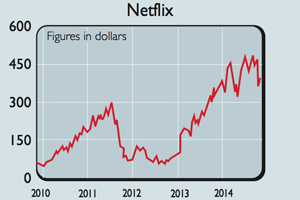
One of the most difficult questions that you need to answer when buying shares is: “How much is too much to pay?” This is definitely a problem confronting any potential investor in this US-listed internet TV company.
At $387 each, the shares trade on an eye-watering 86 times expected earnings for 2014. History has told us that paying this kind of price rarely pays off in the long run.
However, once in a while, there are companies that radically change the way in which people do things, and end up making huge amounts of money for their shareholders as a result. Could Netflix (Nasdaq: NFLX) be one of those?
Maybe. There is no doubt that the way in which people are using their television sets is changing. They increasingly want to choose what they watch at a time that is convenient for them. This is where Netflix has found its raison d’être.
Of course, TV recorders have existed for years, but being able to tap into an on-demand library of TV programmes and films to stream over the internet is very appealing.
At the moment it seems that Netflix is leading the race to own this market, ahead of the likes of Amazon and others. It has already built up a customer base of over 50 million across the world. With streaming accounting for a very low proportion of TV viewing, the growth potential could still be enormous.
Netflix is also proving a great way for telecom companies to offer their customers TV content while reaping the benefits of all the extra internet traffic that comes with it.
BT and Virgin are doing this in the UK, while Netflix has just launched in six European countries, offering them a potential market of 66 million extra households with more likely to follow.
Competition is hotting up
But it won’t be straightforward for Netflix to capitalise on these trends. Growth in its core US market is slowing down and competition is increasing. The content owners of hit TV series, such as HBO and CBS, want a piece of the action and are moving into selling content directly to their customers. Time Warner (which owns HBO) wants to partner with cable
operator Comcast to exploit the growth of internet TV streaming, although any hopes Comcast had of offering faster streaming than Netflix look as if they will be thwarted by government plans to enforce equal internet speeds for all users (known as ‘net neutrality’).
Whether Netflix will face the same competition in overseas markets is not as clear-cut. If it turns out to be less fierce, the current expansion could prove to be very lucrative.
The advantage that Netflix may have is that its prices are cheaper than those offered by cable and satellite companies for their TV packages: it costs from $8 per month (£5.99 per month in the UK).
It may not have the latest blockbusters, but many households might well be prepared to wait for the huge differential in prices. Netflix is also investing in its own content to improve its attractiveness to customers.
Another issue is the strain that high-traffic services such as Netflix put on broadband infrastructure. It seems sensible to assume that prices will have to go up to pay for this.
However, Netflix’s experience of hiking prices in the US has not done catastrophic damage to its business so far, although it has contributed to a slow down in customer growth rates.
Can it deliver the profits?
Netflix has to deliver big growth in profits to justify buying the shares now. It expects US gross margins to increase from 30% to 40% within five years. Higher profits will also free up money to buy more exclusive content.
The overseas investments the firm is making will take some time to pay off. However, investors can take heart from the fact that Netflix’s business in Canada is now making similar margins to the US after just four years in operation.
I’d understand why many investors would not want to go anywhere near Netflix shares at the current valuation. The risks of disappointment and heavy losses are certainly high. But if you have a bit of spare cash and fancy a gamble, this company might be worth a look.
Verdict: very risky buy at $387